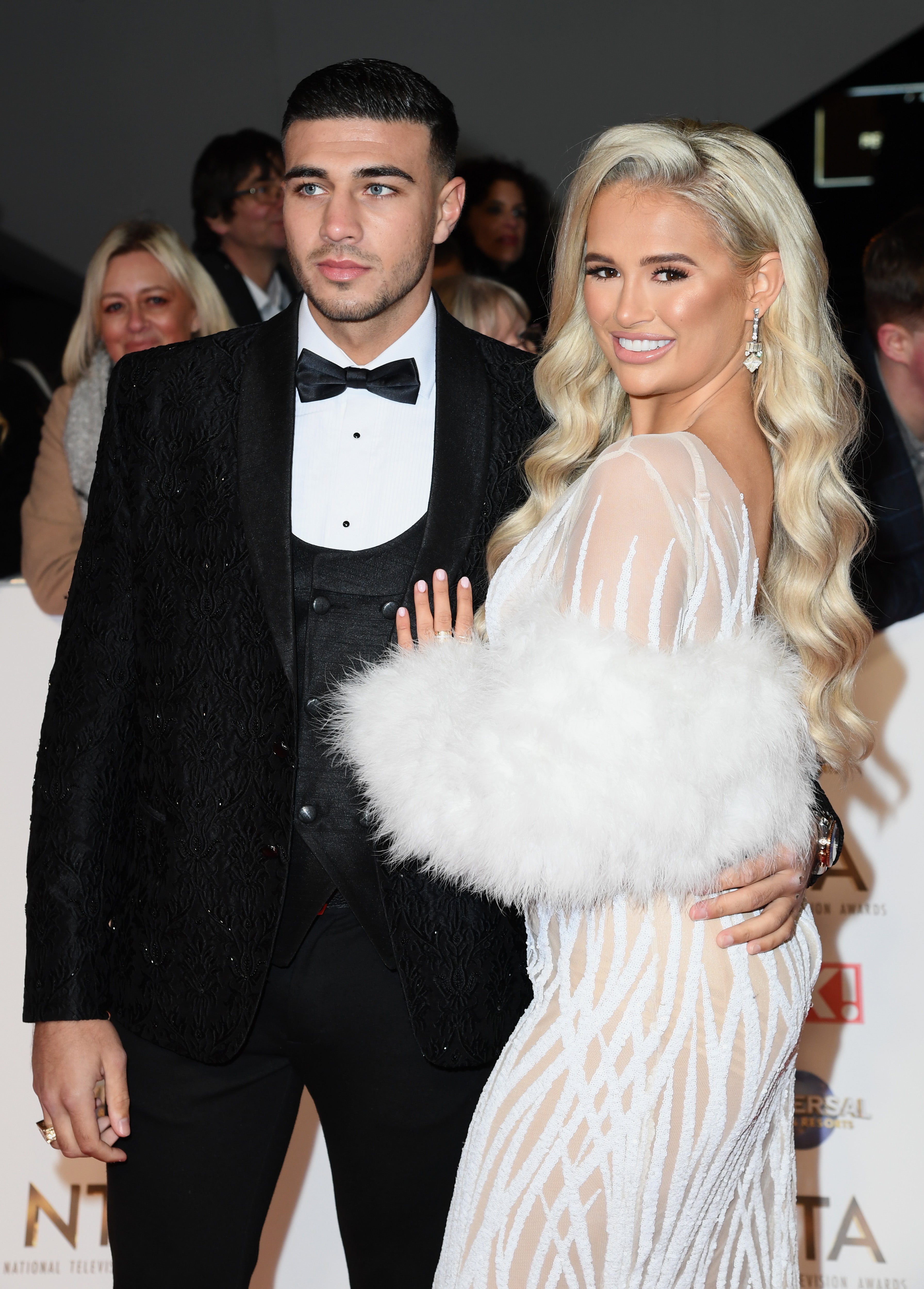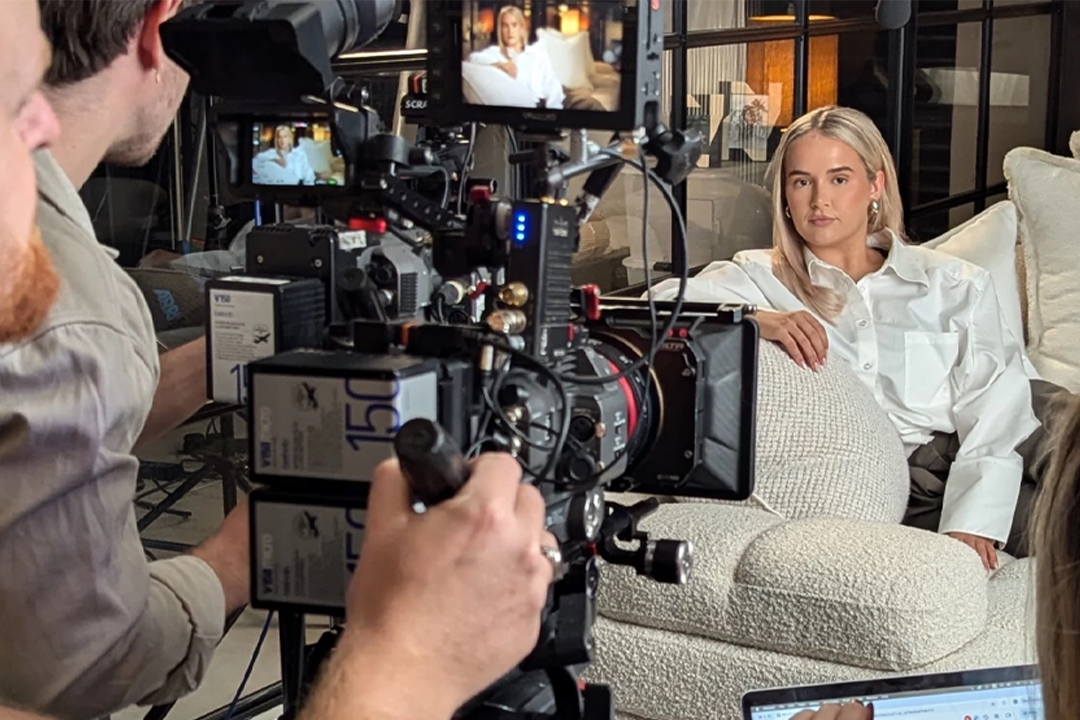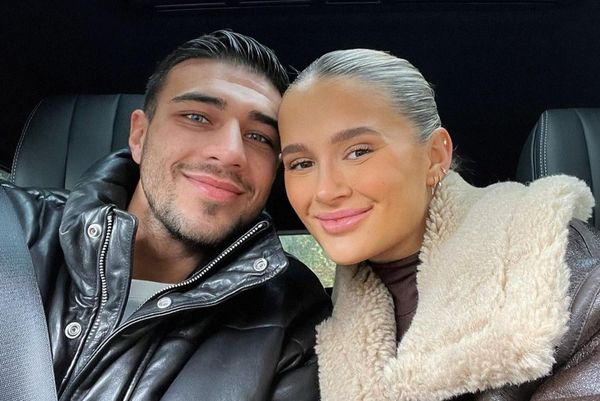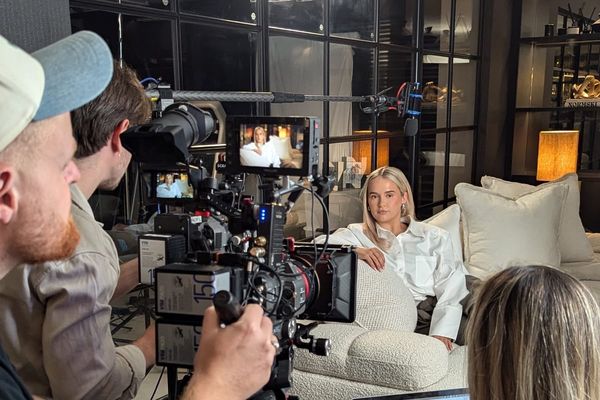A radiant young woman is sitting in front of a camera, applying her makeup and running through her plans for the coming week. Behind her is a beautifully lit walk-in closet filled with row upon row of t-shirts and knits in various shades of grey, interspersed with designer handbags. Welcome to the world of Molly-Mae Hague, the UK’s undisputed influencer extraordinaire: here, the athleisure is always neutral, the blow dries are luxuriant and there’s always time for a quick iced latte jaunt to Gail’s. For all this luxury, though, Hague’s chatter is endearingly, well, normal: she’s at pains to point out the fact that she’s had a bit of a breakout, and that her blonde hair is scraped back in a bun. Never mind the rogue spot, I think to myself, her fake tan looks great. Can I buy it? A few clicks later, yes, I certainly can.
Since entering the Love Island villa in 2019, the now 25-year-old has built up a staggering social media following (8.3 million on Instagram and nearly 2 million subscribers on YouTube at the time of writing) and established a fashion and beauty business empire. Her next venture? Molly-Mae: Behind It All, her very own reality show, arriving on Prime Video on 17 January. Anticipation is high – because the series looks set to cover her much-discussed (well, much-discussed by everyone apart from her) split from fiancé and fellow Islander Tommy Fury, which sent shockwaves through millennial and Gen Z group chats last summer.
How has Hague managed to succeed where so many of her fellow Love Island alumni have, frankly, floundered? And why does this queen of beige intrigue us so much? Molly-Mae’s ascent is not a rags-to-riches story, more the steady rise and rise of a business-savvy girl from a solidly middle-class background. She grew up in Hitchin, Hertfordshire, raised by two police officer parents. As a teenager, she competed in pageants, then joined the Fashion Retail Academy in London. Here, she “fell into influencing”, she told SheerLuxe. “I was getting my friends to take street-style pictures of me in my college outfits.” Her first YouTube videos covered well-trodden territory, all high street hauls and hair and makeup routines.
By the time she made her entrance as Love Island 2019’s first “bombshell” contestant, she’d amassed 10,000 YouTube subscribers and 100,000 Instagram followers. She strode into the villa with a peroxide topknot and a dream – to grow her following and cement her personal brand. That’s not a cynical, love-is-dead read of the situation; in a video posted one year after her time on the show, she admitted that signing up was “a business move”. In 2019, Love Island was at the peak of its pop cultural supremacy, with millions of viewers tuning in each night to watch her and Fury’s romance bloom.

Hague clearly had one eye on her reputation “on the outside”, but her relationship felt authentically sweet too. The moment when Tommy returned to the villa after a few days hanging out with a new bunch of female contestants in Casa Amor, clutching Molly’s cuddly toy as a symbol of his enduring fidelity, was worthy of a Richard Curtis romcom by way of ITV2. And who could forget Molly lurking behind a plant pot, the greenery failing to obscure her towering bun, spying on Tommy’s chat with new contestant Maura Higgins? She and Fury eventually came in third place, but as their Majorcan summer ended, Hague’s Instagram following had hit 2 million (so who was the real winner?).

What exactly, then, is Hague’s specific appeal? She occupies an unusual middle ground: between aspiration and everygirl relatability. She carries Chanel handbags but loves Zara. Her £3.8m Cheshire mansion (aka the Molly-Maison) is filled with high-end versions of the slogan prints you see on Etsy, as well as bargain bits from Primark and Homesense. Essentially, she’s a high-end hun – and although her Instagram grid is a shiny showcase, over on YouTube, she’s appealingly vulnerable. She often appears makeup-free, wearing pyjamas or trackies. And she’s self-deprecatingly funny, whether she’s wondering whether she has accidentally served up a raw carrot cake to her employees at their office “bake-off” or over-ordering Chinese food with her sister Zoe (then documenting their post-takeaway slump).
While she might come across as guarded in more traditional interviews – after meeting her for British Vogue, interviewer Sirin Kale described Hague as holding herself “with the stiff formality of a princess on a royal visit” – watching her videos is a bit like receiving a one-way FaceTime from that school friend you’ve known for years. Despite all the polish, she can be bracingly honest about issues that will affect her young female fans, too. In 2020, she revealed that she was getting her facial fillers dissolved, in a bid to stop “normalising” this treatment among young women. The following year, she spoke about her experience with endometriosis, including her seven-year path to diagnosis. And she’s been candid about the ups and downs of motherhood after giving birth to her and Fury’s daughter Bambi, now nearly two.
Her relationship with boxer Fury (he’s the younger half-brother of former heavyweight champion Tyson) had an air of the prom king and queen about it. Yes, Fury’s 2023 marriage proposal had Hollywood production values and featured a ring rumoured to be worth £600,000. But they also shared photos from low-key nights in and cinema dates (Molly’s Instagram verdict on acclaimed arthouse horror Saint Maud? “Traumatised at how terrible that film was”) and griped about each other on camera. Vice summed it up well in 2021 when they branded the pair “the most basic but beloved couple”.
She has acquired a fashion cachet while retaining her authenticity
But Hague’s success is not just the result of endearing relatability. While other Love Island alumni often fall into the trap of posting #sponcon scattergun, flogging everything from whitening toothpaste to crypto schemes, Hague has played a longer, cleverer game. Rather than attaching her name to any old thing, she focused on collaborating with brands that she’d use or wear anyway. Think of her team-up with Beauty Works, which comprised hair extensions and styling tools. Or her much-vaunted creative director role at PrettyLittleThing, a fast fashion label that pretty much embodied the Love Island aesthetic. This high-profile gig earned her a rumoured £5m annually, until she stepped down in 2023.
She has also monetised parts of her signature look. Filter by Molly-Mae promises her glowing tan in a bottle. And Maebe, the fashion line she launched last autumn, essentially offers versions of her favourite clothes. Think oversized, square-shouldered blazers, wide-legged jeans in pale washes and cosy knits in her signature neutral palette. It’s essentially a Gen Z equivalent of Kate Moss’s Topshop line, in that it offers younger shoppers a chance to dress almost exactly like their style icon (although the elevated prices have prompted some gripes on social media).
This business acumen has steadily elevated her to a unique position in the UK influencer ecosystem. Where other Islanders have relied on riding the merry-go-round of reality show appearances post-villa, hopping between Dancing on Ice, I’m a Celebrity and Celebs Go Dating, she has ascended to a higher tier of celebrity, continuing to share her life on social media but doing so on her own terms. She has also acquired a fashion cachet while retaining her authenticity; she can appear on the red carpet at Cannes one week and then share a video about, say, popping out to pick up a Starbucks the next.

Not everyone has warmed to her specific charm, though. In fact, despite the quotidian nature of the photos, videos and chatter that she puts out into the digital ether, she has become a surprisingly divisive figure. Sometimes, the scandals feel a bit like a storm in a teacup, such as the time when she had to apologise to the nation of Italy after unilaterally describing their cuisine as “grim”. But one of her biggest controversies came when she appeared on Steven Bartlett’s The Diary of a CEO podcast at the start of 2021. While answering questions on her speedy rise to the top of the influencer food chain, she told podcasting’s premier Huel advocate that “Beyoncé has the same 24 hours in a day that we do”. And just to double down on the “girlboss” logic, she added that “if you want something enough you can achieve it, it just depends on what length you want to go”.
People were saying, ‘It’s Princess Diana and Charles’”
These fridge magnet aphorisms landed with a thud. She was branded out of touch, unaware of her privileges, the epitome of “girlboss” individualism; someone even changed her surname to “Thatcher” on her Wikipedia page. The remarks were especially dissonant, though, in an interview promoting Hague’s big fast fashion role. About a year before Hague’s appointment, an undercover Sunday Times report had claimed that workers in a Leicester factory linked to PLT parent company Boohoo were being paid just £3.50 an hour. At the time, Boohoo said that conditions were “totally unacceptable”, adding that the factory, Jaswal Fashions, was not a direct supplier; the brand also said it would be “taking immediate action to thoroughly investigate how our garments were in their hands”. The disparity between these headlines and Hague’s multi-million pay cheque felt particularly stark.
These missteps might have been enough to bring down another influencer, but Molly-Mae has proved pretty much unsinkable. Perhaps it’s the sheer size and dedication of her fanbase. Perhaps it’s the fact that, in fairness, she is not afraid to issue mea culpas: “I apologise to the people that have been affected negatively or misunderstood the meaning of what I said in the podcast,” she said after the Diary of a CEO debacle. “The intentions of the podcast were only ever to tell my story and inspire from my own experience.”
Last year, her breakup from Fury cracked their golden couple veneer and seemed to see a collective softening in attitudes: this was, after all, a young mum dealing with a messy and painful situation in public. Some even painted her as the people’s princess of the 2020s: “People were saying, ‘It’s Princess Diana and Charles,’” Hague noted in her Vogue interview.
So what will her documentary bring? Producers have promised that the show’s first three instalments (more are expected to arrive in the spring) will provide an “all access” look at “the Hague nobody has seen before”. Expect Hague to be fully in control of the narrative, though – she’s simply too savvy an operator to do otherwise. It’s Molly-Mae’s world – we’re just living (and shopping) in it.










